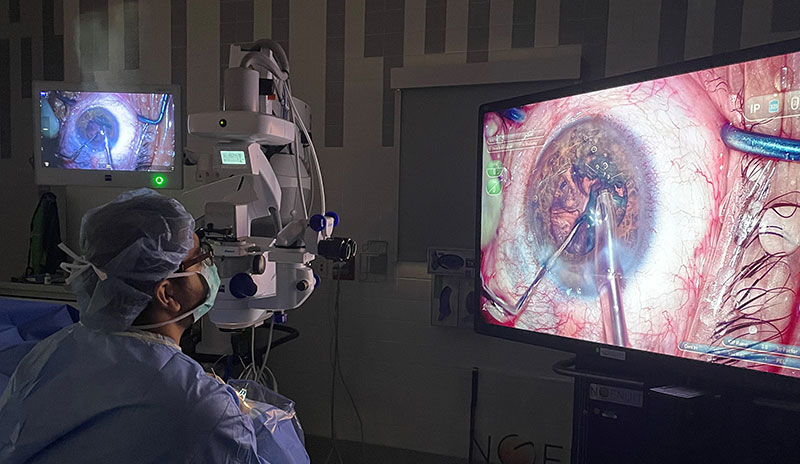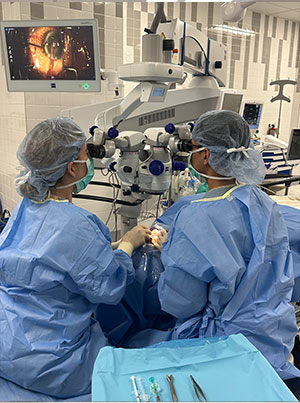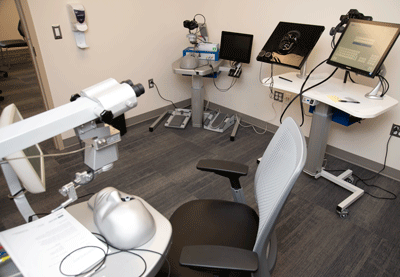Ophthalmology Training

The 1st year begins with a one week orientation, including a comprehensive introductory lecture series and practical hands-on experience. The rest of the first year consists of rotations in anterior segment, pediatric ophthalmology, retina, neuro-ophthalmology, and oculoplastics. In preparation for surgery, residents participate in a complete lecture series on cataract surgery, a microsurgical lab course, and several microsurgical simulation modules. In addition, first years have dedicated time to study for the Ophthalmic Knowledge Assessment Program (OKAP) with study resources provided, including the option of a fully Department sponsored basic science course.
The 2nd year residents rotate through glaucoma, cornea, retina, and oculoplastics at Henry Ford Hospital and pediatric ophthalmology and strabismus at Children's Hospital of Michigan. Second year residents see patients in their own continuity clinic one day a week and continue to generate surgical cases. They also run the emergency eye clinic with the first years, where there is ample opportunity to manage trauma and other acute ophthalmologic emergencies. Residents begin to assume major responsibilities as primary surgeon for cataract, oculoplastics, and glaucoma procedures. In addition, there is a high concentration of glaucoma procedures and retina lasers reserved for the second year experience.
In the 3rd year, residents enjoy more advanced clinical and surgical responsibilities. They continue to develop their own patient base from which surgeries are generated and operate approximately one day each week. Rotations include the resident's own continuity clinic, the Southfield and Clinton Township Clinic rotations (which introduce the residents to a high volume practice with an elderly patient population), and the Chairman's Rotation. Third year residents also manage the ophthalmologic inpatient consult service. The overall experience is broad and meets all ABO and ACGME requirements for training in comprehensive ophthalmology. Third year residents have flexibility to tailor their own clinic to emphasize their particular area of interest - such as cataracts, retina, plastics or general ophthalmology.



Surgical training
The surgical training includes opportunities for both emergent as well as scheduled cases at our main hospital campus, with additional surgeries at our outpatient satellite locations and refractive centers. In addition to a wide breadth of intra and extra ocular surgical training, our training also includes certifications for LASIK surgery, refractive IOLs, MIGS, and femto-laser assisted cataract surgery.
Surgical training and experience is complemented by a microsurgery lab course, formal surgical lectures, and ongoing opportunities to practice in our on-site microsurgery lab and on our Eyesi microsurgical simulator. Our program for microsurgery preparation is currently in two parts:
Part 1 - The Ophthalmology Microsurgery Lab is available and accessible 24/7 for ophthalmology residents including during the transitional year. There is a formal microsurgery curriculum which runs 3 hours per week for a duration of 12 weeks, staffed by a minimum of 2 senior staff at each session. Residents will gain knowledge and experience with the basic techniques of ophthalmic microsurgery and will acquire the skills necessary to create a cataract entry wound, trabeculectomy flap, paracentesis, capsulorrhexis, and corneal suturing. Residents will develop a basic understanding of corneal, glaucoma, retina, and muscle surgeries. This lab is additionally used in preparation for any international surgical trips as well as research with new medical devices or surgical techniques.
Our state of the art facility features: 13 surgical stations with individual Leica scopes with recording capabilities and additional visibility (for the instructor) via LED monitors attached to each scope. We are fortunate to have a microsurgery coordinator who assists with lab prep, maintenance, and oversight.
Part 2 - The Eyesi Ophthalmic Microsurgical Simulator is used to teach methods, operational sequences, and movements as preparation for surgery to the human eye. The Eyesi provides basic training modules in cataract and retina surgery, simulating manual and surgical capabilities, as well as modules allowing the realistic execution of surgical operations. Residents will learn and become practiced with skills of pivoting using 2 hands, microscope adjustment, using 2 feet with hands, and hand stabilization. Cataract modules include forceps, anti-tremor, capsulorrhexis, phacoemulsification, and divide and conquer. There are two Eyesi surgical simulators and one Eyesi indirect ophthalmoscope simulator to augment training of retinal examinations, all of which are readily available in the ophthalmology floor in a dedicated simulation room.


.svg?iar=0&hash=F6049510E33E4E6D8196C26CCC0A64A4)
/hfh-logo-main--white.svg?iar=0&hash=ED491CBFADFB7670FAE94559C98D7798)